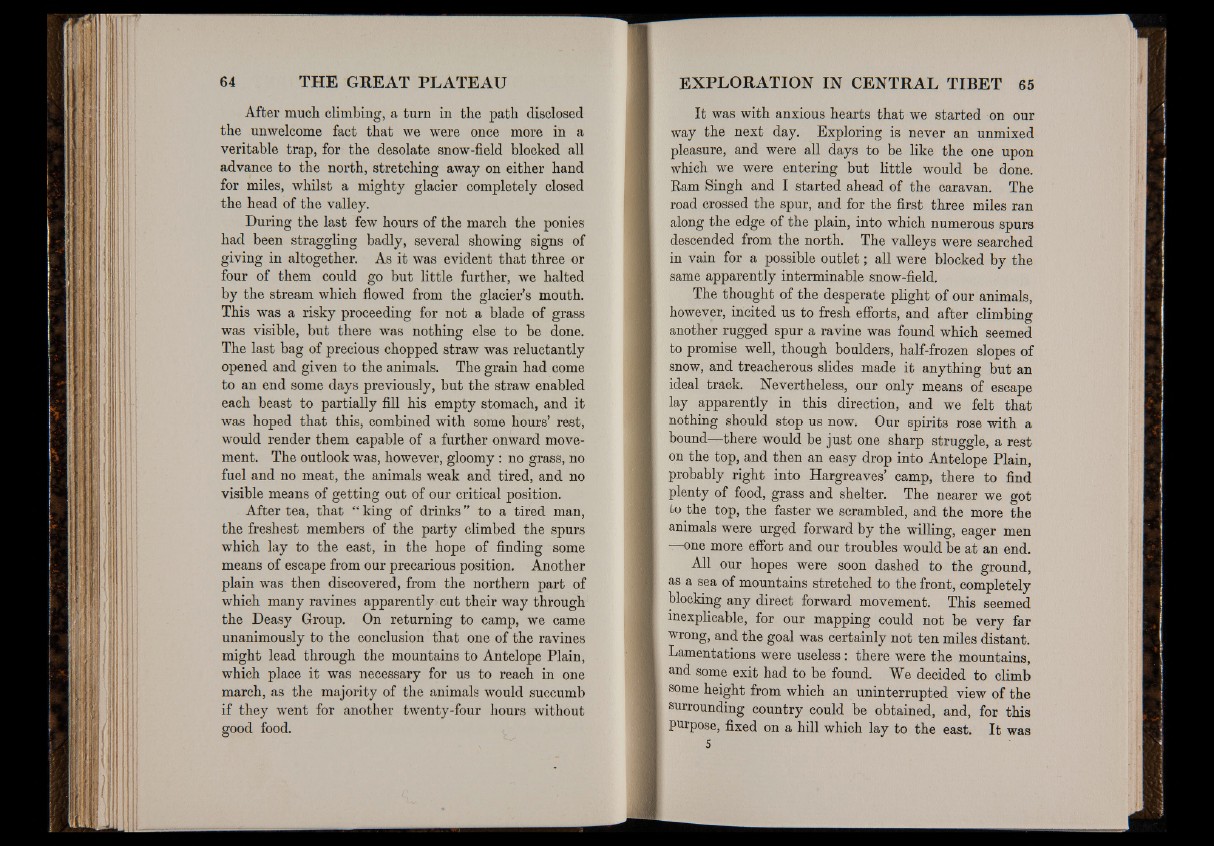
After much climbing, a turn in the path disclosed
the unwelcome fact that we were once more in a
veritable trap, for the desolate snow-field blocked all
advance to the north, stretching away on either hand
for miles, whilst a mighty glacier completely closed
the head of the valley.
During the last few hours of the march the ponies
had been straggling badly, several showing signs of
giving in altogether. As it was evident that three or
four of them could go but little further, we halted
by the stream which flowed from the glacier’s mouth.
This was a risky proceeding for not a blade of grass
was visible, but there was nothing else to be done.
The last bag of precious chopped straw was reluctantly
opened and given to the animals. The grain had come
to an end some days previously, but the straw enabled
each beast to partially fill his empty stomach, and it
was hoped that this, combined with some hours’ rest,
would render them capable of a further onward movement.
The outlook was, however, gloomy : no grass, no
fuel and no meat, the animals weak and tired, and no
visible means of getting out of our critical position.
After tea, that “ king of drinks ” to a tired man,
the freshest members of the party climbed the spurs
which lay to the east, in the hope of finding some
means of escape from our precarious position. Another
plain was then discovered, from the northern part of
which many ravines apparently cut their way through
the Deasy Group. On returning to camp, we came
unanimously to the conclusion that one of the ravines
might lead through the mountains to Antelope Plain,
which place it was necessary for us to reach in one
march, as the majority of the animals would succumb
if they went for another twenty-four hours without
good food.
It was with anxious hearts that we started on our
way the next day. Exploring is never an unmixed
pleasure, and were all days to be like the one upon
which we were entering but little would be done.
Ram Singh and I started ahead of the caravan. The
road crossed the spur, and for the first three miles ran
along the edge of the plain, into which numerous spurs
descended from the north. The valleys were searched
in vain for a possible outlet; all were blocked by the
same apparently interminable snow-field.
The thought of the desperate plight of our animals,
however, incited us to fresh efforts, and after climbing
another rugged spur a ravine was found which seemed
to promise well, though boulders, half-frozen slopes of
snow, and treacherous slides made it anything but an
ideal track. Nevertheless, our only means of escape
lay apparently in this direction, and we felt that
nothing should stop us now. Our spirits rose with a
bound—there would be just one sharp struggle, a rest
on the top, and then an easy drop into Antelope Plain,
probably right into Hargreaves’ camp, there to find
plenty of food, grass and shelter. The nearer we got
to the top, the faster we scrambled, and the more the
animals were urged forward by the willing, eager men
—one more effort and our troubles would be at an end.
All our hopes were soon dashed to the ground,
as a sea of mountains stretched to the front, completely
blocking any direct forward movement. This seemed
inexplicable, for our mapping could not be very far
wrong, and the goal was certainly not ten miles distant.
Lamentations were useless : there were the mountains,
and some exit had to be found. We decided to climb
some height from which an uninterrupted view of the
surrounding country could be obtained, and, for this
purpose, fixed on a hill which lay to the east. I t was
5